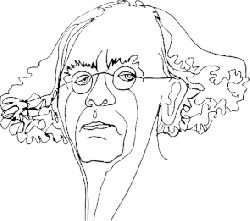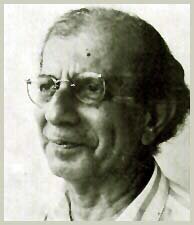Nissim Ezekiel : A Short Introduction
This is a poem I read as a school boy. It is rather funny and very interesting and some of the words have lived in my mind all these years. I managed to find the poem online, which was very exciting. I publish the poem and then a short commentary on that I found also online, followed by a biography of the poet. It would be nice if you could leave your comments.
The Patriot by Nissim Ezekiel
I am standing for peace and non-violence.
Why world is fighting fighting
Why all people of world
Are not following Mahatma Gandhi,
I am simply not understanding.
Ancient Indian Wisdom is 100% correct,
I should say even 200% correct,
But modern generation is neglecting -
Too much going for fashion and foreign thing.
Other day I'm reading newspaper
(Every day I'm reading Times of India
To improve my English Language)
How one goonda fellow
Threw stone at Indirabehn.
Must be student unrest fellow, I am thinking.
Friends, Romans, Countrymen, I am saying (to myself)
Lend me the ears.
Everything is coming -
Regeneration, Remuneration, Contraception.
Be patiently, brothers and sisters.
You want one glass lassi?
Very good for digestion.
With little salt, lovely drink,
Better than wine;
Not that I am ever tasting the wine.
I'm the total teetotaller, completely total,
But I say
Wine is for the drunkards only.
What you think of prospects of world peace?
Pakistan behaving like this,
China behaving like that,
It is making me really sad, I am telling you.
Really, most harassing me.
All men are brothers, no?
In India also
Gujaratis, Maharashtrians, Hindiwallahs
All brothers -
Though some are having funny habits.
Still, you tolerate me,
I tolerate you,
One day Ram Rajya is surely coming.
You are going?
But you will visit again
Any time, any day,
I am not believing in ceremony
Always I am enjoying your company"

A caricature of Nissim Ezekiel.
The following is a short commentary which gives a context to the poem and is copied from http://www.cs.rice.edu/~ssiyer/minstrels/poems/516.html
He's (Ezekiel) most famous for his wry commentaries on contemporary India - often written in an exaggerated 'Indian English' - note, for instance, the overuse of the present continuous tense in today's monologue. (Or is it that much of an exaggeration? I meet people who talk like that all the time...).
This poem is in many ways typical of Ezekiel: a wry view of patriotism mixed with some fairly sarcastic political commentary. It appears to have been written around the time of the infamous Emergency in 1977 (which was invoked by the then Prime Minister Indira Gandhi - to suppress her political rivals, according to some).
That particular Indira regime was marked by lots of corruption, a '20 point program' for regeneration, the forced sterilization of people (to implement a 'one family, one child' rule mooted by her power hungry and vicious son Sanjay Gandhi)... all as seen through the eyes of an old pedant gossiping over a cup of lassi (sweetened yoghurt) with his neighbor. Also, note the dig at the 'unity in diversity' which is official Indian policy. India is a huge mix of several races - most of which speak different languages, wear different clothes ...
All in all, though, a refreshing change from blood and thunder jingoism.
This is a not so short bio of Nissim Ezekiel, the poet. This is culled verbatim from http://www.answers.com/topic/nissim-ezekiel

Nissim Ezekiel (December 24, 1924 - January 9, 2004) was a poet, playwright and art critic. He was considered one of the foremost Indian writers in English of his time.).
Early life
Ezekiel was born in Bombay (now Mumbai). Ezekiel's father was a botany professor and his mother, principal of her own school. He belonged to Mumbai's Jewish community known as 'Bene Israel' . In 1947, Ezekiel did his Masters in literature from Wilson College, University of Mumbai. In 1947-48, he taught English literature at Khalsa College, Mumbai and published literary articles. After dabbling in radical politics for a while, he sailed to London in November 1948. He studied philosophy at Birkbeck College. After a three and half years stay, Ezekiel worked his way home as a deck-scrubber aboard a cargo ship carrying arms to Indochina.).
He married Daisy Jacob in 1952. In the same year, Fortune press (London) published his first collection of poetry, A Time to Change. He joined The Illustrated Weekly of India as an assistant editor in 1953 and stayed there for two years. Soon after his return from London, he published his second book of verse Sixty Poems. For the next 10 years, he also worked as a broadcaster on arts and literature for All India Radio.).
Career
He published his book The Unfinished Man in 1960. After working as an advertising copywriter and general manager of a picture frame company (1954-59), he co-founded the literary monthly Imprint, in 1961. He became art critic of The Times of India (1964-66) and edited Poetry India (1966-67). From 1961 to 1972, he headed the English department of Mithibai College, Mumbai. The Exact Name, his fifth book of poetry was puublished in 1965. During this period he had short tenures as visiting professor at University of Leeds (1964) and University of Chicago (1967). In 1967 while in America, he experimented with hallucenogenic drugs, probably as a means to expand his writing skills. He finally stopped using them in 1972. In 1969, Writers Workshop, Calcutta published his The Three Plays. A year later, he presented an art series of ten programs for Mumbai television.
On the invitation of the US government, he went on a month long tour to the US in November, 1974. In 1976, he translated poetry from Marathi, and co-edited a fiction and poetry anthology. His poem The Night Of The Scorpion is used as study material in Indian and British schools.
Ezekiel received the Sahitya Akademi cultural award in 1983 and the Padma Shri in 1988. He was professor of English and reader in American literature at University of Mumbai during the 1990s, and secretary of the Indian branch of the international writers' organization PEN.
After a prolonged battle with Alzheimer's disease, Nissim Ezekiel died in Mumbai, January 9 2004 at age 79.
When he began his writing career in the late 1940s, his use of formal and correct English was criticized, given its association with colonialism. After 1965, he began experimenting with exaggerated 'Indian English'. Ezekiel, being a member of the Indian Jewish community, approached poetry as an outsider and was different from the nationalistic Indian literature of that time. Most of his poetry was that of the urban India, issues of alienation, love, marriage and sexuality. He acted as a mentor to younger poets, such as Dom Moraes, Adil Jussawalla and Gieve Patel. In the last few years of his life, he was deeply involved in helping Mumbai poets, his advice being forthright, but seldom blunt.
List of Books by Nissim Ezekiel
Time To Change - 1952
Sixty Poems - 1953
The Third - 1959
The Unfinished Man - 1960
The Exact Name - 1965
The Three Plays - 1969
Hymns in Darkness - 1976
Some of his well-known poems
Night of the Scorpion (His most cited poem.)
The Professor
Case Study
Enterprise
Poet, Lover, Birdwatcher
Background, Casually
Poster Prayers
7 comments:
I really owe it to you (a lot!) for my enjoying reading Indian English literatures.
I guess, I never had enjoy reading them much without your lectures, haha.
keep it up, buddy.
sorry for digressing bigtime but wheres fanaa???
soon, very soon. the heat is nerve wreacking and mind numbing.
just a small thanx from a student who nearly went crazy trying to find material on ezekiel for her project:)
Hi , I am Sidhant and would like to thank u for helping me with my school
project.
Nice reading. I was introduced to Ezekiel in graduation with his 'Night of the Scorpion'. Thanks for the essay.
Totally enjoyed reading the essay on Nissim Ezekiel. Had read his 'The Night of the Scorpion' in graduation.
Post a Comment